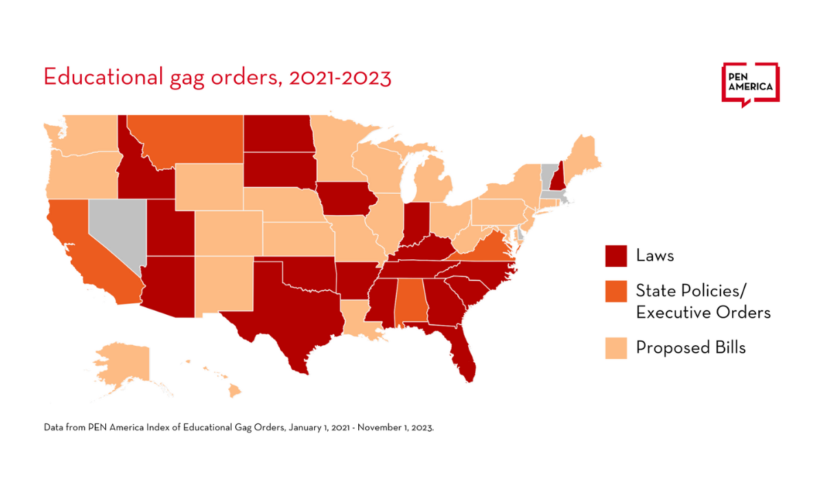During this summer, a team of students from MIT embarked on a journey to the sou …
1.3 Million Teachers and 100,000 Professors Subjected to ‘Educational Gag Orders’, Report Finds
Jennifer Livingstone

A new report from the free-speech watchdog group PEN America reveals that this year, state legislatures have introduced 110 bills seeking to limit discussions on race, U.S. history, and LGBTQ individuals in schools and colleges. Out of these, 10 have become law. Combined with the 20 bills passed in the previous two years, as well as 10 executive orders and state agency mandates, there are now a total of 40 legal restrictions on educator speech in 21 states. This affects an estimated 1.3 million K-12 teachers, 100,000 public college and university professors, and millions of students.
The tactics of those pushing for these limitations on education have shifted over the last three years, according to the analysis conducted by PEN. This reflects a combination of increasing public opposition to the laws and efforts to bypass political controversies. Consequently, it is anticipated that more bills, some of which may be more severe, will be introduced in 2024.
Jeremy Young, the program director of PEN’s Freedom to Learn initiative, states, “What we have seen this year is that the people who are advocating for these laws are not going to stop because the poll numbers are bad, they’re not going to stop because some parts of the laws have been struck down by the courts, they’re going to continue… They’re going to continue to evolve these laws in more and more insidious ways.” Unless these laws are consistently defeated, whether in the courts, at the ballot box, or in the legislature, the crisis will persist.
Proponents of the measures argue that parents should have more control over their children’s education and that colleges should not focus on “divisive concepts.” These individuals claim that teaching topics such as race, history, and LGBTQ issues places undue pressure on students to conform to a particular ideology and infringes upon the free speech rights of those with differing viewpoints.
Meanwhile, public opinion on the matter greatly varies depending on the specific topics, the age of the students, and how the restrictions are framed. The genesis of this movement can be traced back to former President Donald Trump’s denunciation of “toxic propaganda” in September 2020. Subsequently, the first state bill to curtail discussions on race was introduced in Mississippi. The majority of the speech-restricting measures put forward in 2021 and 2022 targeted race, history, and “divisive concepts” in K-12 schools and colleges. However, in 2023, no bills were proposed simultaneously targeting both levels of education.
This year, 39 of the introduced measures aimed solely at stifling conversations about LGBTQ individuals and topics in elementary and high schools. Most of these bills took inspiration from the Florida law commonly referred to as the “Don’t Say Gay” act. Critics argue that these laws have led to book bans and the dismantling of anti-bullying efforts.
In the coming year, more bills are expected to be introduced, with some potentially going even further. For the first time, a few of the proposed measures have targeted individuals’ speech. For instance, Oklahoma has proposed a bill to prohibit students from disclosing their LGBTQ identity, while Ohio has one that would impose disciplinary sanctions on college students or faculty who violate others’ “intellectual diversity rights” by discussing topics such as allyship, diversity, social justice, systemic racism, and gender identity. Even individuals expressing institutional positions on relevant topics may be considered in violation of the law.
PEN researchers point out that the legislation proposed in 2023 and anticipated for the following year will be more challenging to combat compared to previous laws due to several practical reasons. While college faculty free speech rights are likely to be upheld by the courts, advocacy groups have struggled to meet the legal threshold for proving harm caused by bans on LGBTQ topics. This situation suggests that public opinion plays a significant role in the change of tactics among those in favor of limiting educator speech.
Surveys consistently indicate that Americans support teaching older students about race and oppose book bans on the topic. However, opinions differ concerning LGBTQ topics, with a more pronounced partisan divide. Furthermore, there is disagreement about the appropriate age for discussing such topics, with only approximately 30% of Americans believing it is suitable for elementary students.
Morgan Polikoff, one of the researchers behind a survey conducted at the University of Southern California, agrees that public opinion likely influenced the shift in tactics employed by supporters of speech limitations. Republicans have made headway with Black and Latino voters and may therefore be hesitant to portray race as a divisive concept. It is also worth noting that attempts to curtail professors’ speech, a prominent feature of bills proposed in 2021 and 2022, have proven to be highly unpopular.
Recent bills have aimed to dismantle faculty unions, senates, and other internal groups that protect academic freedom. These measures may be unfamiliar to most people. For instance, a recently passed Florida law reduces faculty hiring and tenure rights and makes it virtually impossible for some classes and majors to be taught based on the stipulation that course content should not distort significant historical events or teach identity politics.
The PEN report describes this new breed of legislation as an attempt to undermine university governance and autonomy, ensuring that no one is in a position to push back against future attempts to censor faculty. As more bills are expected in the future, it is imperative to address these concerning restrictions on educator speech to safeguard academic freedom and promote well-rounded education.

